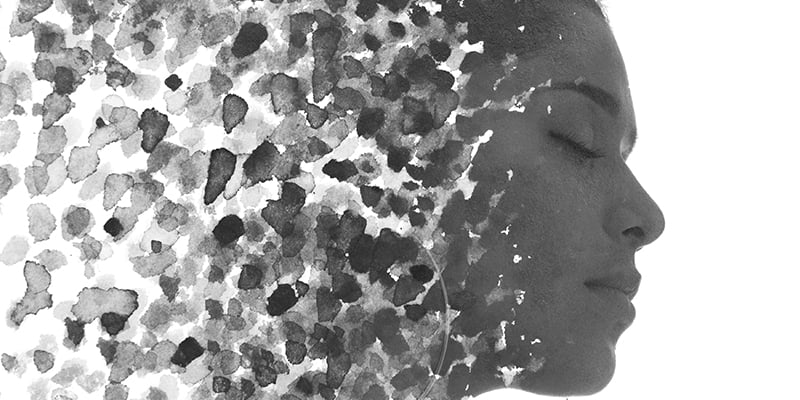
For decades, most people have believed depression is a disorder caused by low serotonin in the brain. In fact, many physicians and mental health professionals have ascribed to what is known as the serotonin hypothesis too. However, a new study published in the journal, Molecular Psychiatry, has just turned this theory on its head.
A team of 5 researchers conducted a comprehensive review of all relevant studies about the various mechanisms of serotonin on depression that were published from the late 1960s to 2020. Altogether, the participants in these studies numbered in the tens of thousands. The authors concluded that there is no substantial evidence to support the widely accepted belief that depression is the result of abnormal serotonin levels in the brain.
For over 30 years of clinical practice, Amen Clinics has been saying that a serotonin imbalance may be present in some people with depression, but it is not the only cause of depressive symptoms.
For over 30 years of clinical practice, Amen Clinics has been saying that a serotonin imbalance may be present in some people with depression, but it is not the only cause of depressive symptoms. Depression is not just one thing. Click To TweetIF NOT SEROTONIN, WHAT CAUSES DEPRESSION?
While it was the most exhaustive analysis of the research to date, many others have also explored and questioned this subject since its inception more than 50 years ago. A 2020 peer-reviewed study in Frontiers in Psychiatry noted that some of the huge clinical trials of popular antidepressant medications done from 2005-2007 failed to provide prolonged relief of symptoms. And in 2009, Thomas Insel, the head of the National Institute of Mental Health at the time, noted in a journal article, “The unfortunate reality is that current medications help too few people to get better and very few people to get well.”
Nonetheless, millions of antidepressant prescriptions are written each year in the U.S. The most widely prescribed antidepressants are selective serotonin reuptake inhibitors (SSRIs), which increase the availability of serotonin in the brain.
With the news and social media platforms recently reporting about the seemingly debunked serotonin-depression link, many people are wondering, what, then, might cause them to feel depressed if it’s not a chemical imbalance?
In a sense, the answer is simple: Depression is not just one thing. In fact, depression is a symptom with many different causes, just as chest pain is a symptom of numerous health problems. For this reason alone, antidepressant medications may work for some people, but they aren’t going to help everyone who feels depressed.
7 CAUSES OF DEPRESSION THAT AREN’T RELATED TO SEROTONIN
Depression doesn’t happen in a vacuum—something causes the symptoms to emerge and for treatment to be effective, it’s critical to figure out what that is. Therefore, in addition to learning about a patient’s history and presenting problems, the physicians at Amen Clinics believe in the importance of looking at the brain with SPECT imaging to help them identify the biological underpinnings that could be driving symptoms. Over the past few decades, they have found many different potential causes of depression that aren’t connected to a serotonin chemical imbalance, including these 7:
1. Head trauma
Mood changes are very common after a concussion, although in many cases they may not occur for months. Some research has found that 30% of those who sustain a traumatic brain injury will develop depression.
2. Toxins
Long-term exposure to environmental toxins such as industrial solvents and pesticides, as well as toxic mold, can damage the brain, decreasing low blood flow in areas that are critical for mood regulation. Drinking alcohol and using recreational drugs are also toxic to the brain, plus alcohol and many drugs are depressants that exacerbate symptoms.
3. A history of trauma
Having a higher number of adverse childhood experiences (ACEs), such as emotional, physical, or sexual abuse, neglect, household domestic violence, incarceration, substance abuse, and other traumatic circumstances early in life is associated with an increased risk for numerous physical and mental health problems, including depression.
4. Chronic stress
When life throws curveballs that persist and are difficult to manage, the stress hormone cortisol might feel like it’s burning through your veins. Over time, stress can cause damage to the hippocampus, a part of the brain that is involved with memory and mood.
5. Hormonal issues
When thyroid, estrogen, testosterone, insulin, and other hormones are out of balance, your brain can be affected, making you vulnerable to feeling blue or irritable. Factors such as age, a poor diet, and stressors can disrupt healthy hormone levels.
6. Inflammation
Not only can it wreak havoc on your body, but an inflammatory response in the brain can damage neurons and affect how they function, putting you at risk for depression and other psychiatric issues. One of the most insidious causes of inflammation is high blood sugar that stems from diabetes and being overweight or obese. Infections like Lyme disease and COVID-19 can also trigger inflammation in the brain that leads to depressive symptoms and other problems
7. Food intolerances
Many people think of foods like gluten, corn, soy, and dairy as causing digestive distress—which they can do for those who are intolerant to them. However, these foods can also negatively affect your mood. In many cases, eliminating them from your diet for a couple of weeks, then adding them back in can reveal whether a particular food is an underlying reason for your symptoms.
Because there are many different causes of depression, there’s no way a single type of treatment is going to work for everyone. Furthermore, depression and anxiety are found together 75% of the time. And, through the brain SPECT imaging work at Amen Clinics, 7 different types of anxiety and depression have been identified.
TREATING DEPRESSION
Prescription antidepressants—regardless of what their mechanism of action really is—can be helpful for some people but not for everyone. However, there are myriad other non-pharmaceutical treatment options available that can be successful in reducing symptoms of depression. The key is knowing the root cause of depressive symptoms and which depression type you have, so you can get targeted strategies to help you feel better as quickly as possible.
Depression and other mental health issues can’t wait. At Amen Clinics, we’re here for you. We offer in-clinic brain scanning and appointments, as well as mental telehealth, clinical evaluations, and therapy for adults, teens, children, and couples. Find out more by speaking to a specialist today at 888-288-9834 or visit our contact page here.





Excellent article!
Comment by Herman Petersen — September 2, 2022 @ 8:49 AM
Informative article. I have had depression for 40 years. I have been consistent with medication for the last 19 years. The generic form of Effexor XR has been my lifesaver. It was the third medication I had to try.
Comment by Catherine Bourke — September 9, 2022 @ 3:58 AM
Very interesting article. I think too many patients are prescribed drugs and that’s that. Glad to read other avenues are being researched.
Comment by Ken Thrasher — September 9, 2022 @ 3:59 AM
The Amen Clinic identified my brain injury 2 years after my accident. I have struggled since that diagnosed. I am blessed now to have found a functional neurology clinic who concurs with your article today. Thank you, I am now moving in the right direction.
Comment by Cathy — September 9, 2022 @ 5:17 AM
From my experience with myself and other family members, I see much truth in this article!
Comment by Joyce Oyer — September 15, 2022 @ 4:42 AM
Very informative and helpful knowledge of a truly overlooked mental health conditions many have today. I believe in this Clinic has and can't stress enough has me aware of how my condition can be now improved by reading such articles as Dr. Amen Clinic . I thank you for your posts. Current Depression and Anxiety patient as myself seeking both medications and Pschiciatry treatment to help me.
Comment by David Bencina — January 5, 2023 @ 10:17 AM
Knowledgeable, thank you Dr. Amen
Comment by David Bencina — January 5, 2023 @ 10:20 AM
Do you take Bc/bc marketplace insurance? My 36 son has had multi head injuries. Diagnosed with major depressive disorder. Depression does run on both my and fathers side. He has twin sister with same issues. I don't have a lot of money to help.
Comment by Dale Waters — November 5, 2023 @ 5:36 AM
Excellent comment. Depression is not just caused by low serotonin but food intolerances too.
Comment by Amrita — November 29, 2023 @ 11:43 AM
excellent article!
Comment by Doug Morris — November 29, 2023 @ 6:52 PM